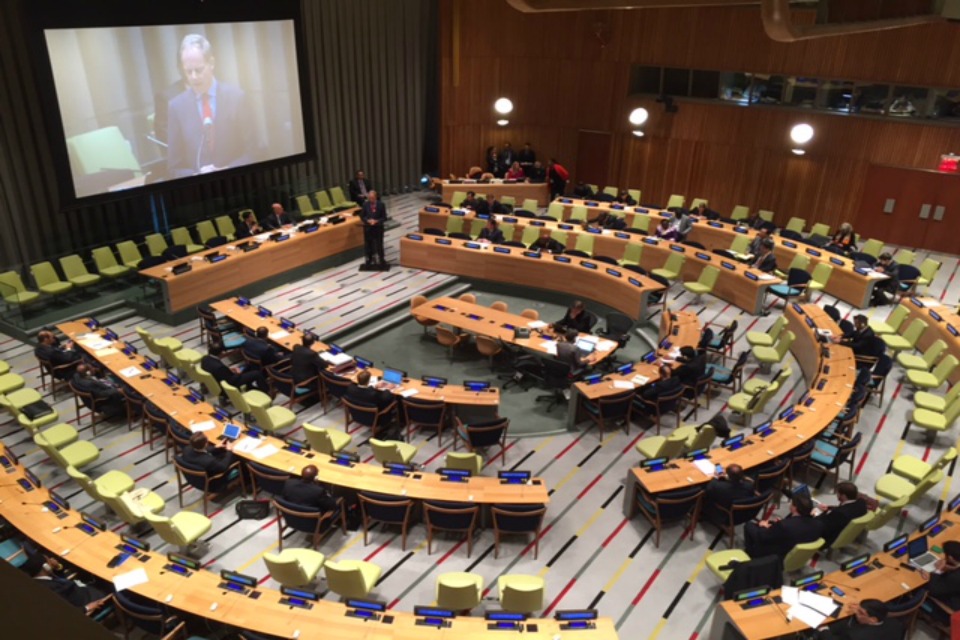"We’ll continue to work for a UN that is transparent, agile and efficient."
Statement by Ambassador Matthew Rycroft of the UK Mission to the UN at the High-level Thematic Debate on the Maintenance of International Peace and Security

Thank you Mr President.
I welcome today’s debate and thank the President of the General Assembly, the Secretary-General and Kevin Rudd for their statements.
The United Nations was created following the destruction of the Second World War to save future generations from the scourge of war. Now age 70, it remains a symbol of collective will; a will to pursue peace and development, to protect human rights, and to respect international rules and norms.
Whether in 1945, or today, or in 70 years time, the preservation of peace will always be our central mission.
The very first resolution adopted by the General Assembly, addressed peaceful uses of atomic energy and the elimination of weapons of mass destruction.
So it is fitting that this year, we have seen a landmark agreement on Iran’s nuclear programme. We have seen the Security Council united in its opposition to the use of chemical weapons in Syria and elsewhere. And we have held the nuclear non-proliferation treaty review conference. We will never shrink from the task of stopping the spread of these abhorrent tools of war.
But preserving peace goes well beyond curbing the spread of weapons. Over the years, the United Nations has increasingly stressed the importance of conflict prevention and peace-building. We need to continue with efforts on them both. By identifying and addressing the triggers for conflict, by providing the forum for mediation including the full participation of women. And in following up the three reviews that many speakers have already mentioned this morning. It is important that we address the totality of the conflict cycle.
The Leaders’ Summit convened by President Obama this week on peacekeeping was a success. There is no better symbol of the tireless pursuit of peace than the blue helmets of the 128,000 UN peacekeepers in fragile environments around the world. Prime Minister Cameron announced this week that the UK is stepping up our support, particularly in Africa, where we will work to ensure that South Sudan has a stable future and that progress in Somalia is not allowed to stall.
We also need to understand - looking at the whole conflict cycle - the intrinsic links between poverty and injustice on the one hand, peace and security on the other. Goal 16 of the newly agreed Global Goals does just that. Now we must get on and implement those Global Goals.
Mr President,
There is much to be proud of, but we have more, much more to do. Any organisation that stands still quickly becomes irrelevant, and the challenges today are more complex and more inter-related than ever.
So the United Kingdom strongly supports reform of the United Nations, an enlarged and reformed Security Council, better working methods, and even dare I say it more interactions in this chamber and every other.
We’ll continue to work for a UN that is transparent, agile and efficient.
Mr President,
In the time that it takes us to hold our meeting today, several thousand more people will be making the desperate choice to split from their families, to leave their homes and to leave their countries.
Over 4 million people have fled their homes in Syria alone since the start of the crisis. Whether in Syria, in Somalia or anywhere else in the world, they flee because of violent and oppressive regimes, and because of the cancer of violent extremism and the terrorism it breeds.
The UK is the second largest contributor to the humanitarian effort for Syrian refugees. But humanitarian efforts only ever address the consequences not the underlying causes. We need to redouble our efforts to tackle those underlying causes. That means combating ISIL and other terrorist organizations and undermining them and their twisted ideology. And it means showing unwavering strength in the face of those who violate the sovereignty or territorial integrity of other States.
It means standing up to those whose tyranny shows no respect to the principles, rules and norms on which this organization is founded.
Our UN charter talks of the worth of the human person. So when a dictator takes up arms or barrel bombs of chemical weapons against his own people, we have a moral duty to act, to act in support of the victims not in support of the regime.
As the representative of the Non-Aligned Movement said earlier, sadly there have been too many vetoes in the Security Council used to prevent credible action to respond to or to prevent atrocities. Those vetoes stain the conscience and reputation of the Security Council and indeed the whole United Nations.
Mr President,
We have a heavy responsibility in the General Assembly and the Security Council to tackle any threat to international peace and security. We the members must truly works as united nations. We cannot confront the challenges of today without a truly collective effort, including drawing on the strength of the African Union and other regional organizations.
We need the UN Charter to be at the heart of an effective rules-based international system.
It was in that spirit of unity that 51 countries came together 70 years ago, armed with a collective commitment to peace and security. It is in that same spirit that we need to come together today to set aside narrow self interest and redouble our efforts to maintain the global good of peace and security.
Thank you.